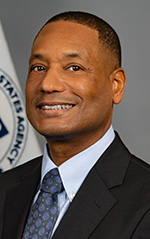Addressing Mental Health Needs at USAID
USAID strives to build a healthier workplace to ensure mission readiness, at home and abroad.
BY CLINTON D. WHITE AND RANDY CHESTER

Beth Walrond
In 2022, as our nation eased its way out of the COVID-19 pandemic, U.S. Surgeon General Dr. Vivek Murthy released his 48-page “Framework for Workplace Mental Health & Well-Being.” In it he wrote: “We have an opportunity and the power to make workplaces engines for mental health and well-being. Doing so will require organizations to rethink how they protect workers from harm, foster a sense of connection among workers, show workers that they matter, make space for their lives outside work, and support their long-term professional growth. … Benefits will accrue to both workers and organizations.”
Well before Dr. Murthy issued his framework, USAID leaders understood the significant role of the workplace in shaping the mental and physical well-being necessary for effective, productive work. Driven by various executive orders, congressional legislation, and federal regulations, USAID established the Staff Care program in 2012 to provide an array of stress-mitigating services that improve the mental health and well-being of its workforce while helping the agency achieve its foreign policy goals. Staff Care’s suite of programs centers on supporting an environment where the workforce feels valued, each employee’s physical and mental well-being is bolstered, and a healthy balance between work and life responsibilities is maintained.
Today, USAID is recognized as having one of the top staff care programs in the federal government, one that exceeds government-wide benchmarks for employee engagement and satisfaction. In the 2021 Federal Employee Viewpoint Survey (FEVS), for example, 78 percent of USAID’s employees said they were satisfied or very satisfied with the agency’s health and wellness programs, compared with 64 percent in other U.S. government agencies. In that same survey, USAID employees reported health and wellness program utilization rates at 10 percentage points above the government-wide average.
Given the intense nature of USAID’s humanitarian and development assistance work around the world and the stress of living and working in high-threat areas, USAID will continue to strategically invest in employee assistance, work-life balance, wellness, and organizational resilience programs to ensure the well-being of its employees and the effectiveness of its work.
Challenges for FS Employees
FS employees face mental health challenges due to their unique work and lifestyle. These challenges affect not only individual mental health but also the health of the agency.
USAID FS employees serve in complex and difficult posts, including conflict-prone areas such as Somalia and South Sudan and high-threat/high-crime posts such as El Salvador and Bangladesh. They face the ever-present threat of authorized and ordered departures around the globe, including in Haiti, Niger, and Ukraine. And many are still coping with the effects of the COVID-19 pandemic.
These stressors are in addition to what regular Americans face in their daily lives as they struggle to find a balance between job demands and the needs of their immediate and extended families. Multiple deployments and frequent moves, exposure to threats, unprecedented workloads, accelerated promotions, separations from family, inadequate rest, and gaps in mental health support affect individual mental well-being.
USAID will continue to strategically invest in employee assistance, work-life balance, wellness, and organizational resilience programs.
Balancing life overseas and back home (wherever home may be) creates another challenge for FS employees as they manage the emotional toll of living away from family and friends while fulfilling diplomatic duties. The turmoil of managing professional responsibilities and personal relationships can result in feelings of guilt, loneliness, and disconnection, which then affect overall mental health.
The constant need to adapt to new environments and cultures, form new relationships, and build new networks of support can be emotionally draining. If the post is in a high-threat region, FS employees often find themselves in stressful situations, facing real or perceived security risks, which result in trauma-related issues. Ordered departures are traumatic for staff and their families.
The AFSA Mental Health Survey
In March 2024, AFSA teamed with USAID Staff Care to survey USAID members, exploring their current views on stress and mental health. The survey gathered both quantitative and qualitative data on the impact of stressors external to the workplace (environmental factors) and internal stressors within the USAID workplace. The response rate was 17.5 percent (280 out of an estimated 1,600 active USAID AFSA members).
Top-ranked external stressors included: working in a high-threat/high-crime post (64 percent), working in a conflict-prone area (54 percent), and experiencing traumatic events at post (45 percent). Respondents said terrorist attacks, accidents, violent incidents, or personal threats have had lasting effects on their mental health, citing anxiety, PTSD-like symptoms, difficulty coping, and fear for family members’ safety.
Internal stressors were named with even greater frequency. Respondents cited excessive workload (80 percent), lack of leadership/management support (74 percent), long work hours (69 percent), and relationship difficulties with supervisors (49 percent). Many described “toxic” work environments that were related to anxiety, depression, panic attacks, mood swings, sleep disturbances, and emotional dysregulation.
Many also described a delayed processing of stress, where the full effect of traumatic events isn’t felt until later. This can lead to emotional distress and cognitive or physical impairments, which contribute to unhealthy coping mechanisms. “Unaddressed stress can manifest in many ways that have the potential to affect employees’ personal and professional lives,” USAID Staff Care Director Tarshia Freeman told us in March. “The combination of unaddressed stress, increased work demands, and work conflict may all contribute to the overall mental health and well-being of staff. It is imperative that individuals adapt healthy coping strategies to help combat burnout, mental health risk, and chronic health issues.”
Changing Attitudes
In recent years, we have seen a shift in the overall view of mental health, in part due to younger generations normalizing discussions about mental well-being and challenging long-held stigmas. The increase in mental health awareness includes an understanding of the problem, support for those dealing with mental health issues, and appreciation of mental health as a critical part of well-being.
The COVID-19 pandemic amplified the demand for balancing personal and professional interests and mental health support. Additional factors specific to the Foreign Service, such as the 2021 Afghanistan withdrawal, the conflict in Ukraine, and the Israel-Gaza war, have also increased PTSD diagnoses and elevated awareness of the need for mental health support. Additionally, moral injury—psychological distress stemming from actions or inactions conflicting with one’s moral code—is another challenge gaining increased attention.
Forty-three percent of AFSA/Staff Care survey respondents reported having sought counseling, demonstrating a high need and suggesting a changing attitude toward seeking support. The number of counseling clients served by USAID Staff Care rose from 307 in Fiscal Year 2013, the first full year of Staff Care, to 626 during FY21 amid COVID-19, when Staff Care counselors recorded the highest-ever number of clients. USAID Staff Care served 516 counseling clients in FY23; so far, numbers are level in FY24.
AFSA teamed with USAID Staff Care to survey USAID members, exploring their current views on stress and mental health.
As FS employee demographics continue to change, there is a growing awareness of the specific and unique mental health considerations for the increasing numbers of BIPOC (Black, Indigenous, and People of Color), multicultural families, LGBTQ+ individuals, and singles serving overseas. BIPOC FS employees often navigate diplomatic assignments abroad while confronting systemic racism, cultural differences, and identity-related stressors. LGBTQ+ employees face challenges related to acceptance and safety in countries with varying attitudes about gender and sexual orientation. Single FS personnel can experience feelings of isolation and loneliness as they struggle to form connections at post.
Some FS employees report feeling that they lack sufficient support from agency leadership. Recurring themes in the AFSA/Staff Care survey included discrimination, racial insensitivity and tensions, sexual harassment, and gender discrimination. USAID’s perceived unwillingness to hold offenders accountable further distressed and demoralized some survey respondents.
“Corridor reputation,” an unofficial term used in diplomatic circles to describe an employee’s character, qualities, and interactions based on informal colleague observations, remains a concern. FS employees may fear that acknowledging mental health challenges—or pushing for a healthier work-life balance—could tarnish their reputations within the tight-knit community of diplomats and thus jeopardize career advancement. FS employees also express concern that seeking mental health therapy might affect their security and medical clearances.
“Unfortunately, mental health stigma is a common concern that many individuals may fear due to unknown reactions or perceptions of others,” says Staff Care Director Freeman. “Hesitation to seek help may exacerbate the very issues they seek to address.”
Getting Support: A Holistic View
The USAID Staff Care program employs a strengths-based approach, placing mental health within a positive framework that emphasizes resilience, adaptability, and coping strategies rather than focusing on mental health as an illness. This holistic perspective recognizes that well-being extends beyond the individual to include work-life balance, social support networks, and organizational culture.
Staff Care provides a range of programs, services, and resources designed to bolster the well-being and work-life balance of USAID’s entire workforce, regardless of hiring mechanism—in the workplace, at home, and in the community—and Staff Care services are available to all family members. Proactively promoting resilience among FS employees involves cultivating environments that encourage emotional well-being and providing tools to navigate challenges unique to the Foreign Service. Resilience is not simply an individual’s responsibility. Employees work best and are healthiest when they are part of organized, functional teams, offices, bureaus, and missions.
When AFSA/Staff Care survey respondents were asked which of several organizational stressors had affected them negatively at USAID, 79 percent noted excessive workload, with lack of management/leadership support a close second. Even in high-threat environments, organizational stressors were more significant than external environmental stressors. Many respondents felt overwhelmed by the volume of work and the expectations placed on them, citing heavy workloads, long work hours, relentless deadlines, unrealistic expectations, constant pressure to perform, and the pressure to manage multiple responsibilities simultaneously. All of this leads to exhaustion, burnout, and difficulty in maintaining personal and professional interest, affecting physical and mental health.
FS employees may fear that acknowledging mental health challenges could tarnish their reputations within the tight-knit community of diplomats.
Some respondents described toxic work environments where they experienced various forms of mistreatment or harassment, including bullying, discrimination, racial insensitivity, and sexual harassment that contributed to feelings of stress, anxiety, depression, and low morale. Some cited a lack of adequate resources for dealing with mental health issues, such as difficulty accessing counseling. And some felt undervalued or unrecognized for their contributions, leading to feelings of frustration, isolation, disillusionment, and reduced job satisfaction.
Organizational stress can impede both the individual’s and the group’s ability to bounce back and effectively tackle issues. The Staff Care Organizational Resilience Team specifically addresses this by working with units to help manage organizational stress. These services complement Staff Care’s work with individuals by developing workplace environments with healthy teams and increased levels of employee engagement.
A focus on individual and organizational resilience is just one way that Staff Care uses a holistic approach to support USAID employees. Traditional employee assistance counseling is offered not only to staff but also to family members. Critical incident response, psychoeducational evaluations, training, and support groups all address mental health and the multifaceted effects of trauma. Available services also promote physical health and work-life balance. Organizational resilience services include data-gathering on team functioning, resulting in interventions focused on team culture, change management, communication, and more.
A Continuing Priority
USAID has been a leader in prioritizing and understanding the mental health support needs of employees and their families serving overseas. The USAID Staff Care program and initiatives demonstrate to employees that not only does their work matter, but they matter as individuals.
Staff Care offers workshops through its U.S. direct-hire licensed clinical social workers. These social workers are assigned to Washington, D.C., and provide the full spectrum of employee assistance services, including case management. This support is designed to ensure the highest level of readiness by helping Foreign Service employees navigate challenging assignments, personal problems, Exceptions Committee requests for compassionate curtailment or curtailment for professional needs, medical clearances, and performance and conduct processes. The program offers workshops to help employees build knowledge, skills, and healthy habits for stress management, increased resilience, and improved well-being.
The wellness and work-life program connects the entire USAID workforce (regardless of staffing mechanism) and their family members with internal and external resources, services, and referrals to reduce stress. Those programs include, but are not limited to, the following:
- the Caregiver Action Network, a national organization that supports individuals who care for aging loved ones or family members coping with chronic health conditions;
- the Parent Encouragement Program, offering the USAID workforce and their family members access to parenting support programs;
- the USAID lactation program;
- a child-care subsidy for eligible U.S. direct-hire USAID employees based in the United States; and
- free legal and financial education and referrals.
Workplace mental health and well-being is critical to ensuring mission readiness across the U.S. government and within the agency. USAID will continue its work to improve and support the current and next generation of FS employees.
When sharing or linking to FSJ articles online, which we welcome and encourage, please be sure to cite the magazine (The Foreign Service Journal) and the month and year of publication. Please check the permissions page for further details.
Read More...
- “USAID Must Weigh Cost of Longer Critical Priority Country Tours” by Sharon Wayne, The Foreign Service Journal: AFSA News, October 2014
- “Long Past Time to Talk About Trauma—Raising Awareness and Resilience” by Angela R. Dickey, The Foreign Service Journal, July-August 2016
- “Compassion Fatigue in the Foreign Service” by Kovia Gratzon-Erskine, The Foreign Service Journal, March 2019






